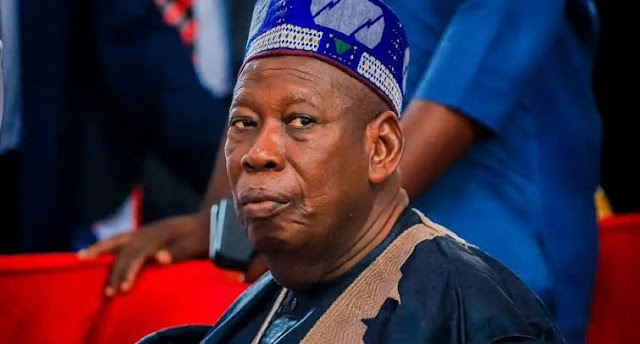The political atmosphere within Nigeria's ruling party, the All Progressives Congress (APC), was thrown into a state of chaos on Friday following the unexpected resignation of its National Chairman, Dr. Abdullahi Ganduje. This development, described by insiders as sudden and without warning, has left many within the party scrambling for answers.
Eyewitnesses at the party's national secretariat in Abuja reported unusual activity earlier in the day, when aides and staff were seen moving personal items from Dr. Ganduje’s office. Initially dismissed as routine, the movement quickly raised eyebrows, especially among party insiders who had not received any prior indication that a major shake-up was imminent.
Confirmation of the resignation eventually came from a senior official of the party, who spoke under strict anonymity. The official kept it brief, stating, “Yes, it is true. He has resigned.” No further details were offered, adding to the mystery and anxiety within the APC hierarchy.
Several sources within the party described the atmosphere at the national headquarters as tense and bewildered. Some staff members appeared visibly shaken, with others pacing hallways or engaging in hushed conversations. For many, the abrupt nature of the exit was troubling, particularly given the critical role Dr. Ganduje was expected to play in upcoming political strategies.
Before assuming the role of National Chairman, Dr. Ganduje served two terms as the Governor of Kano State. His rise to the top of the APC structure was viewed by many as both strategic and controversial. While some praised his political savvy and ability to consolidate power within the party, others criticized what they described as his polarizing leadership style.
Party operatives and analysts are now grappling with the implications of his exit. A political strategist aligned with the APC, who preferred not to be named, stated that Ganduje’s departure could “trigger a ripple effect” across key leadership positions and weaken party unity in the short term.
“This is not just about one man stepping down,” the strategist emphasized. “The party has been trying to navigate internal tensions, and Ganduje was seen as a stabilizing force for certain factions. His absence creates a vacuum that might be difficult to fill quickly.”
Outside the APC headquarters, speculations have intensified over what might have motivated Ganduje’s decision. While no official statement has been released by Dr. Ganduje or his media team, theories range from internal party power struggles to external political pressure. Some even suggested the possibility of a pending investigation or disagreement over policy direction.
Observers familiar with APC internal politics believe the development might be linked to recent high-level meetings involving key stakeholders in the party. One source indicated that Ganduje may have been asked to step down quietly to avoid escalating tension among top-ranking party members. However, none of these claims have been confirmed, and the party leadership remains tight-lipped.
By late afternoon, several party loyalists were seen arriving at the secretariat, hoping to gain clarity or perhaps participate in informal strategy discussions. Still, no official replacement had been announced, and the absence of concrete communication from party executives only added to the growing speculation.
Political analysts warn that the APC must act swiftly to contain any fallout from Ganduje’s resignation. With Nigeria’s political environment already fraught with economic and social challenges, internal disarray within the ruling party could erode public confidence and provide ammunition to opposition forces.
Calls for transparency have begun to emerge from within and outside the party, urging the APC to address the situation promptly. A former lawmaker aligned with the party noted that silence in the face of such a high-profile resignation could send the wrong signal to supporters and stakeholders alike.
Despite the drama unfolding at the national level, there are also reports of unease within Ganduje’s home state of Kano. Political loyalists there have reportedly expressed concern about the potential impact on regional alliances and development initiatives tied to Ganduje’s influence.
As the nation awaits an official explanation, one thing remains clear: the resignation of Dr. Abdullahi Ganduje has created a leadership vacuum at the heart of Nigeria’s most powerful political party. Whether this marks the beginning of a wider restructuring or an isolated event remains to be seen. For now, the APC stands at a crossroads, facing uncertainty at a time when unity and stability are more critical than ever.













![Content Creator Angelica Kelechi Speaks Out on Alleged Sexual Assault at Khloe Abiri’s Spa [VIDEO]](https://blogger.googleusercontent.com/img/b/R29vZ2xl/AVvXsEgQStip4cn2DAOvQ2hNFU30OAFWoxfQIDOnStd0uVgwwxKrFAQYYvtFni6QV04OGP8dyKk5TCAhXM5es9linl1ClhjPzaazz2tTt0LmJ5lFVe5202o2McF9QROT1v2hEyNTdY-M1KRuLTY6OqqysKNfcsY5bCtwCIP8wEQ4AXcfQfTaXWWZiixqf82NDH5a/w72-h72-p-k-no-nu/abiri-khloe123.jpg)






0 Comments
Hey there! We love hearing from you. Feel free to share your thoughts, ask questions, or add to the conversation. Just keep it respectful, relevant, and free from spam. Let’s keep this space welcoming for everyone. Thanks for being part of the discussion! 😊